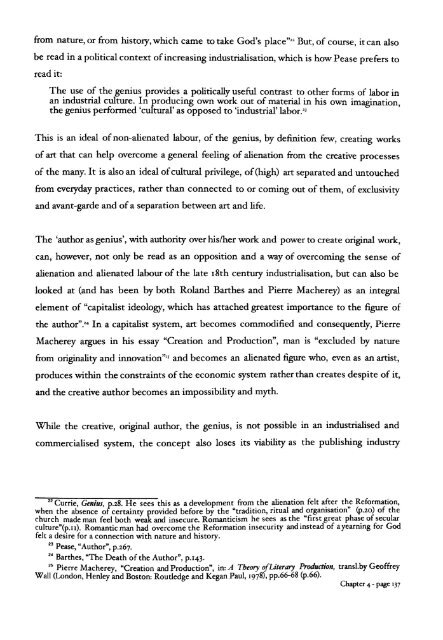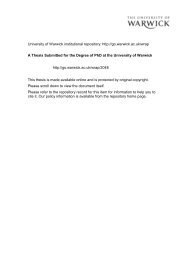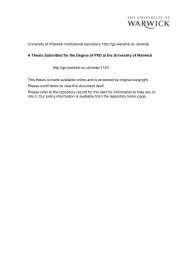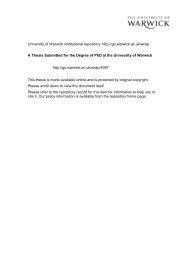From Page to Screen - WRAP: Warwick Research Archive Portal ...
From Page to Screen - WRAP: Warwick Research Archive Portal ...
From Page to Screen - WRAP: Warwick Research Archive Portal ...
You also want an ePaper? Increase the reach of your titles
YUMPU automatically turns print PDFs into web optimized ePapers that Google loves.
from nature, or from his<strong>to</strong>ry, which came <strong>to</strong> take God's place"» But, of course, it can also<br />
be read in a political context ofincreasing industrialisation, which is how Pease prefers <strong>to</strong><br />
read it:<br />
The use of the genius provides a politically useful contrast <strong>to</strong> other forms of labor in<br />
an industrial culture. In producing own work out of material in his own imagination<br />
the genius performed 'cultural' as opposed <strong>to</strong> 'industrial' labor." '<br />
This is an ideal ofnon-alienated labour, of the genius, by definition few, creating works<br />
of art that can help overcome a general feeling of alienation from the creative processes<br />
of the many. It is also an ideal ofcultural privilege, of(high) art separated and un<strong>to</strong>uched<br />
from everyday practices, rather than connected <strong>to</strong> or coming out of them, of exclusivity<br />
and avant-garde and ofa separation between art and life.<br />
The 'author as genius', with authority over his/her work and power <strong>to</strong> create original work,<br />
can, however, not only be read as an opposition and a way of overcoming the sense of<br />
alienation and alienated labour of the late rSth century industrialisation, but can also be<br />
looked at (and has been by both Roland Barthes and Pierre Macherey) as an integral<br />
element of "capitalist ideology, which has attached greatest importance <strong>to</strong> the figure of<br />
the author"." In a capitalist system, art becomes commodified and consequently, Pierre<br />
Macherey argues in his essay "Creation and Production", man is "excluded by nature<br />
from originality and innovation'?" and becomes an alienated figure who, even as an artist,<br />
produces within the constraints ofthe economic system rather than creates despite of it,<br />
and the creative author becomes an impossibility and myth.<br />
While the creative, original author, the genius, is not possible in an industrialised and<br />
commercialised system, the concept also loses its viability as the publishing industry<br />
22 Currie Genius ,.28. He sees this as a development from the alienation felt after the Reformation,<br />
when the absence o certainty provided before by the "tradition, ritual and organisation" (p.zo) of the<br />
church made man feel both weak. and insecure. Romanticism he sees as the "first great phase of secular<br />
culture"(p.n). Romantic man had overcome the Reformation insecurity and instead of a yearning for God<br />
felt a desire for a connection with nature and his<strong>to</strong>ry.<br />
23 Pease, "Author", P.267.<br />
24 Barthes, "The Death of the Author", P.I43.<br />
25 Pierre Macherey, "Creation and Production", in: A Theory ofLiterary Production, transl.by Geoffrey<br />
Wall (London, Henley and Bos<strong>to</strong>n: Routledge and Kegan Paul, 1978), pp.66-68 (p.66).<br />
Chapter 4 - page 137





